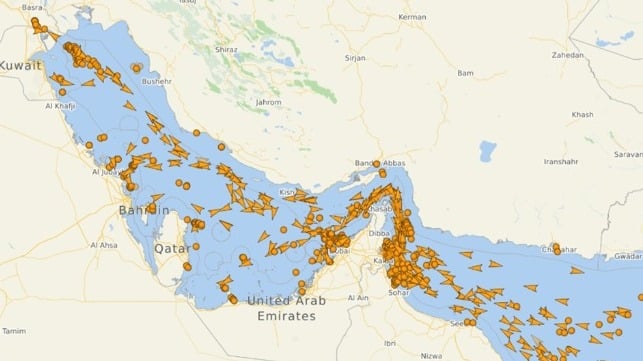After Years in the Dark, Iran's Tankers Switch AIS Transponders Back On

For reasons not yet apparent, Iranian flagged tankers have turned their AIS transmitters back on. For the past seven years, since 2018 when the United States re-imposed sanctions, most Iranian-flagged tankers have travelled the seas with their AIS transmitters turned off in a bid to disguise sanctions-breaking traffic.
The phenomenon has been reported independently by several AIS signal aggregators, and is visible in location plots provided by VesselFinder.com and MarineTraffic.org. Kpler report that 80% of Iranian tankers have transmitted a location signal within the last 48 hours.
It is not clear why AIS systems have been turned back on, simultaneously and across the Iranian-flagged fleet, a move that seems counter-intuitive since snap-back sanctions were re-imposed on Iran by the United Nations on September 28.
Dalga Khatinoglu, an oil & gas analyst writing for Iran International, speculates that the move may be an attempt by Iran to assert legitimacy. It may also be connected to warnings by the United States that travelling without AIS transponders switched on is a contravention of International Maritime Organisation rules, and hence legitimate cause to interdict any such tankers travelling ‘dark’ at sea. Khatinoglu also speculates that the move may have been a response to requirements issued by China, which imports 90% of the oil exported by Iran.
AIS non-transmission and spoofing is associated with transshipments at sea, where it is important for the success of transshipment operations that the location of both the donor ship and receiver be either hidden, or better still to be spoofed to a non-contentious location. In a business where capital costs are very high, chartering time costs money. On top of the cost of involving two VLCCs on at least two transshipment operations per cargo, the process extends shipping times to an average of 10 weeks per shipment.
These extra costs, when compared with straightforward three-week terminal-to-terminal shipments, are expenses borne by Iran on top of the need to discount cargos by up to 10% per barrel. A reversion to conventional tankering operations would thus save Iran considerable sums of money - provided China will still accept cargos. The switch-on of AIS transmitters may be an indication indeed that China has provided such assurances.

that matters most
Get the latest maritime news delivered to your inbox daily.
Bringing Iran to heel, with a ceasefire still shakily in place in Gaza, has now assumed greater importance in terms of the United States midwifing a wider peace in the Middle East. Both China and Iran may be concerned that any American attempt to increase pressure on Iran, which is evidently in a precarious position in terms of domestic stability, would involve interceptions of Iranian tankers at sea. Hence the Iranian move to remove the clandestine element to their export of oil may be an attempt to safeguard oil as a critical source of finance, and to make legitimization of seizures at sea more difficult.
Top illustration courtesy VesselFinder.com.
